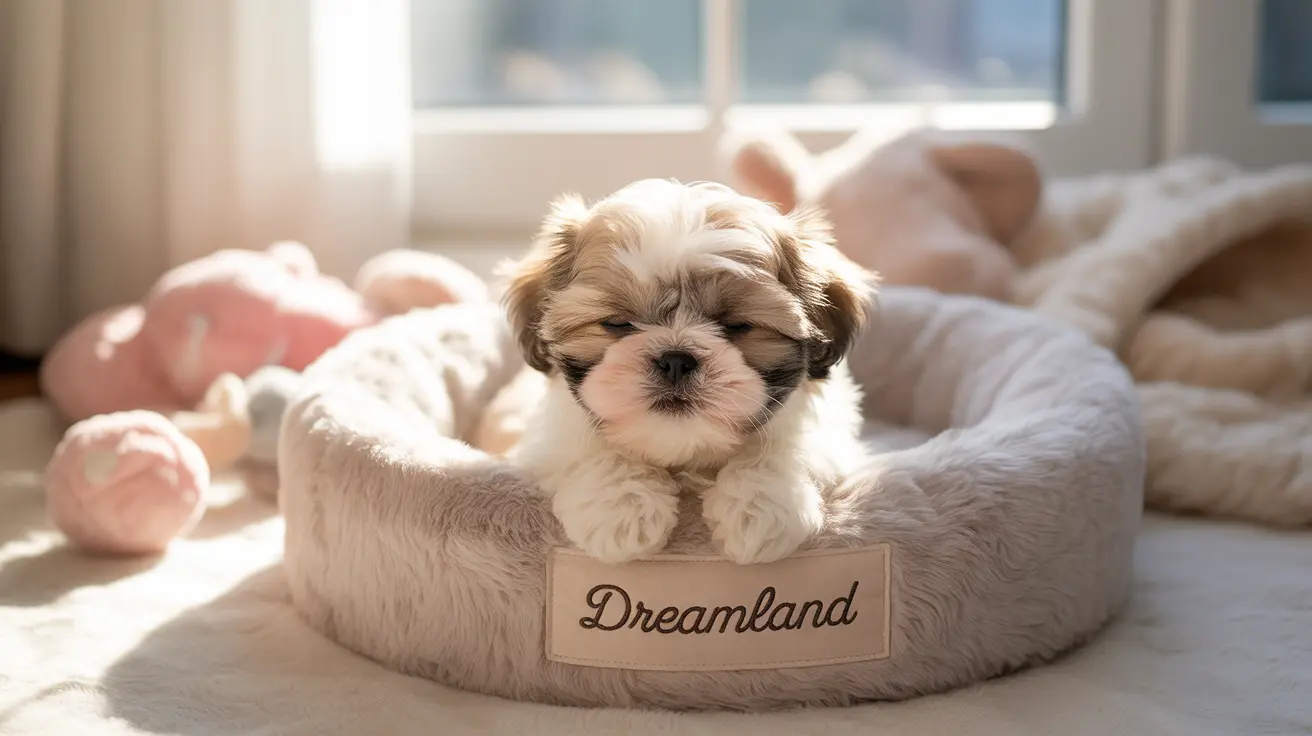Sleep Patterns Through Different Life Stages
Newborn and Young Puppies
Shih Tzu puppies are champion sleepers, spending an impressive 19-22 hours per day in dreamland. This extensive sleep schedule is crucial for their rapid growth and development. During these early months, they wake primarily for feeding and brief periods of play before returning to their slumber.
Adult Shih Tzus
As they mature, adult Shih Tzus typically sleep 12-16 hours daily, which is still considerably more than humans need. This sleep is usually split between nighttime rest and several daytime naps, reflecting their natural polyphasic sleep pattern.
Senior Years
Senior Shih Tzus, typically those over 10 years old, often require 14-19 hours of sleep daily. This increase in sleep needs is natural and helps them manage age-related changes in their bodies.
Why Do Shih Tzus Need So Much Sleep?
Physical Characteristics
Their brachycephalic (flat-faced) structure can lead to more rapid fatigue, especially after physical activity. This unique facial structure means they often need more recovery time, resulting in frequent naps throughout the day.
Breed Temperament
As companion dogs bred for centuries to be loving house pets, Shih Tzus naturally adapt to a more relaxed lifestyle. Their calm demeanor and lower energy levels contribute to their increased sleep requirements.
Environmental Factors
A Shih Tzu's sleep patterns can be influenced by their daily routine, activity level, and living environment. Dogs who receive adequate exercise and mental stimulation tend to develop more regular sleep patterns.
Signs of Healthy vs. Concerning Sleep Patterns
Normal Sleep Behaviors
Healthy Shih Tzus maintain consistent sleep patterns, wake easily when stimulated, and show good energy during their active periods. They should be alert and engaged during awake times, even if these periods are shorter than in other breeds.
Warning Signs to Watch For
While abundant sleep is normal, sudden changes in sleep patterns or extreme lethargy could indicate health issues. Contact your veterinarian if you notice:
- Difficulty waking your dog
- Unusual restlessness during normal sleep times
- Excessive sleep beyond their typical patterns
- Signs of discomfort while sleeping
Creating the Perfect Sleep Environment
To support your Shih Tzu's sleep needs, consider:
- Providing a quiet, comfortable sleeping area
- Maintaining consistent daily routines
- Ensuring appropriate exercise during wake periods
- Offering a high-quality diet to support energy levels
- Creating a calm atmosphere during designated rest times
Frequently Asked Questions
How many hours a day do Shih Tzus typically sleep at different ages?
Newborn puppies sleep 19-22 hours, young puppies 16-20 hours, adults 12-16 hours, and seniors 14-19 hours per day. These variations are normal and reflect the different energy needs throughout their life stages.
Why do Shih Tzu puppies need more sleep compared to adult dogs or other breeds?
Shih Tzu puppies require extra sleep to support their rapid physical growth, brain development, and immune system maturation. Their bodies process and consolidate new experiences during sleep, making it essential for healthy development.
What factors influence how much a Shih Tzu sleeps during the day and night?
Sleep patterns are influenced by age, activity level, health status, daily routine, environment, and emotional well-being. Regular exercise, consistent feeding times, and proper stimulation help regulate their sleep schedule.
How can I tell if my Shih Tzu is sleeping too much due to health or anxiety issues?
Watch for changes in their normal sleep pattern, decreased interest in activities, difficulty waking, or signs of distress. Excessive sleep accompanied by other symptoms like changes in appetite or behavior warrants veterinary attention.
What are the best ways to create a comfortable sleep environment and routine for my Shih Tzu?
Provide a quiet, temperature-controlled space with comfortable bedding. Establish consistent daily routines for meals, exercise, and rest periods. Consider your dog's preferences for sleeping locations and ensure they feel secure in their environment.






